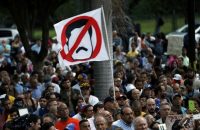Final US Presidential Debates: Five Key Highlights
Experts across Chatham House shared their views on Trump and Biden’s performance and their key takeaways from the last debate. More than 47 million Americans have already cast their vote and few voters are undecided, but the debates still provide a good lens into these two very different candidates.
Throughout the presidential race, there have been concerns regarding foreign interference in the election. How did candidates respond to this threat?
Leslie Vinjamuri: The candidates deflected the question, but it could not have been more timely. Only two days ago, John Ratcliffe, the director of national intelligence, and Christopher A. Wray, the FBI director, announced that Iran and Russia had obtained voter registration data and used this to send threatening emails to voters.… Seguir leyendo »













